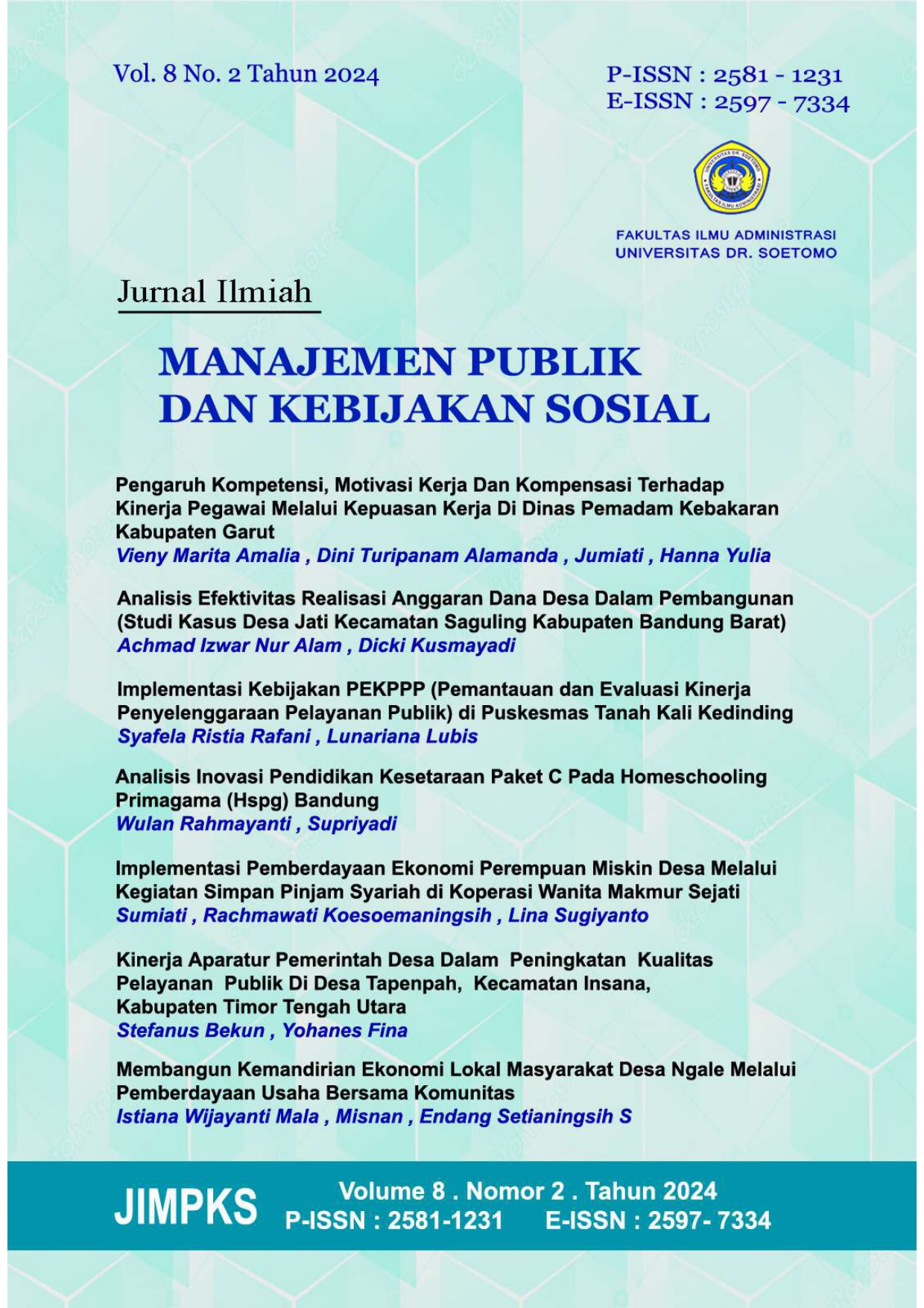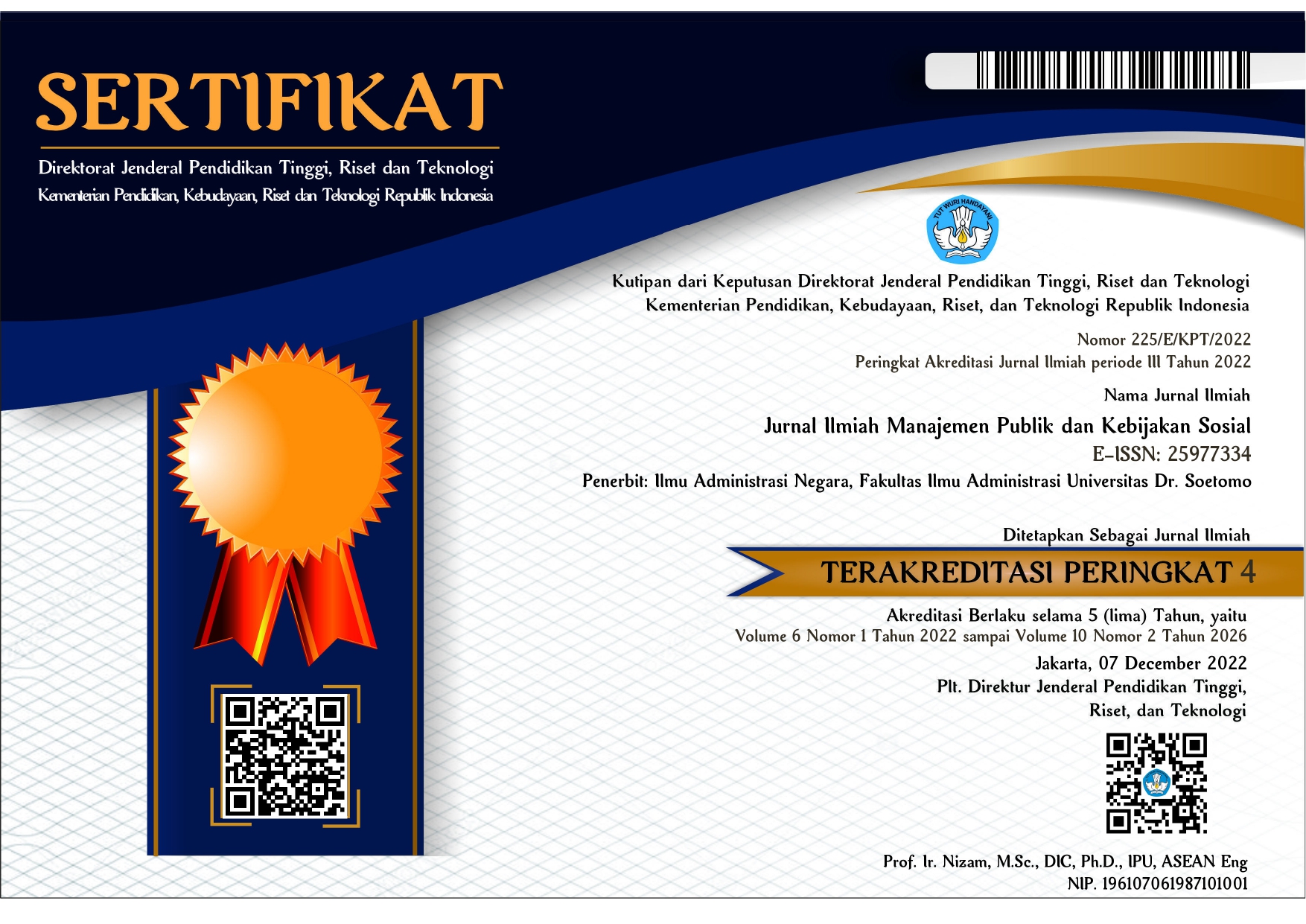Implementasi Kebijakan PEKPPP (Pemantauan dan Evaluasi Kinerja Penyelenggaraan Pelayanan Publik) di Puskesmas Tanah Kali Kedinding
 Abstract views: 284
,
Abstract views: 284
,
 PDF (Bahasa Indonesia) downloads: 103
PDF (Bahasa Indonesia) downloads: 103
Abstract
Service is one form of parameter as an effort to satisfy the needs of both organizations and individuals, because basically the service provided by organizations and individuals is a picture that reflects the quality of the service itself. Public services themselves will continue to experience changes as times change by using current technology. One form is a program from the Ministry of State Apparatus Empowerment and Bureaucratic Reform, namely the PEKPPP program, public services also include the health sector. One of the services provided by the government in the health sector is community health centers held in each region. Puskesmas is one of the Public Service Units, which means it participates in the PEKPPP program held by the Ministry of State Apparatus Empowerment and Bureaucratic Reform. The location of this research is at the Tanah Kali Kedinding Community Health Center. The theory used in this research uses the policy implementation theory by George C. Edward III that policy implementation is influenced by several variables, Communication, Resources, Disposition, and Bureaucratic Structure. The implementation of the PEKPPP program at the Tanah Kali Kedinding Community Health Center is going quite well, although it is experiencing obstacles in the form of data supporting documents that are not well organized. The 2 employees who are responsible for implementing the PEKPPP program at the Tanah Kali Kedinding Community Health Center seem to have mastered the PEKPPP program quite well, seen from their availability in providing the necessary supporting data despite difficulties due to having multifunctional tasks and the lack of clarity in the existence of a special team for the PEKPPP program at the Tanah Kali Kedinding Community Health Center
References
Anon. n.d. Pedoman Menteri Pendayagunaan Aparatur Negara Dan Reformasi Birokrasi Republik Indonesia Nomor 5 Tahun 2023.
ASEAN. 2021. Assessment Report On Public Service Delivery Systems In Asean Member States.
Azhar, Muchar Luthfi Malik, Imam Hardjanto, and Minto Hadi. 2013. “Kemitraan Antara Pemerintah Dan Swasta Dalam Pelayanan Publik.” Jurnal Administrasi Publik (JAP) 1(5):1048–57.
Bunker, Douglas R. 2010. “Implementasi Kebijakan: Apa, Mengapa, Dan Bagaimana HAEDAR AKIB.” 1(1):1–11.
Dianingtyas, Ayu, and Sri Roekminiati. 2024. “Evaluasi Pelayanan SIPRAJA Dalam Pengurusan Data Penduduk Di Kecamatan Taman Sidoarjo.” Jurnal Ilmu Manajemen Dan Kebijakan Sosial 8(1):58–79.
Fitri, Gita, Nirwana, and Darmawati. 2023. “Analisis Kinerja Publik Berdasarkan PermenpanNo.17 Tahun 2017 (Studi Kasus Di Puskesmas Madising Na Mario Kota Parepare).” Jurnal Manajemen, Akuntansi Dan Bisnis 1(2):69–79.
Handoyo, Eko. 2012. Kebijakan Publik. 1st ed. edited by Mustrose. Semarang: Widya Karya Semarang.
Intan. 2023. “Surabaya Raih Penganugerahan Predikat Penilaian Kepatuhan Penyelenggaraan Pelayanan Publik Ombudsman 2023.” Disdukcapil Kota Surabaya. Retrieved (https://disdukcapil.surabaya.go.id/2023/12/15/surabaya-raih-penganugerahan-predikat-penilaian-kepatuhan-penyelenggaraan-pelayanan-publik-ombudsman-2023/).
Jumarianto. n.d. “Efektivitas Pelayanan Publik Berdasarkan Undang-Undang Nomor 24 Tahun 2013 (Studi Penelitian Pada Kantor Kecamatan Barambai Kabupaten Barito Kuala).” -.
Komaria, Nurul, and Anggraeny Puspaningtyas. 2024. “Evaluasi Kinerja Penyelenggaraan Pelayanan Terhadap Kepuasan Masyarakat Di Kecamatan Sawahan Kota Surabaya.” Jurnal Relasi Publik 2(2):111–19.
Marwiyah, M.Si, DR. HJ. Siti. 2022. Kebijakan Publik. Probolinggo.
Maulidiah, Sri. 2014. Pelayanan Publik. 1st ed. Bandung: CV. Indra Prahasta.
Miles, M. B., A. M. Huberman, and J. Saldana. 2014. Qualitative Data Analysis: A Methods Sourcebook. London.
Mustari, S.IP., M.Si, DR. Nuryanti. 2015. Kebijakan PubliK. 1st ed. Yogyakarta: PT Leutika Nouvalitera.
Rahmadana, Muhammad Fitri, Arin Tentrem Mawati, Nurhayati Siagian, Mori Agustina Perangin-angin, John Refelino, Moch. Yusuf Tojiri, Valentine Siagian, Nur Arif Nugraha, Sardjana Orba Manullang, Marto Silalahi, Devi Yendrianof, Anggri Puspita Sari, Made Nopen Supriadi, Marlynda Happy Nurmalita Sari, and Syamsul Bahri. 2020. Pelayanan Publik. 1st ed. Yayasan Kita Menulis.
Rahman, Marjoni. 2021. “Manajemen Pelayanan Publik.” P. 12 in Manajemen Pelayanan Publik, edited by Tahta Media. Samarinda: Tahta Media Group.
Robert, Tiara. 2024. “Penerapan E-Government Di Bagian Organisasi Sekretariat Daerah Kota Pekanbaru.” Jurnal Pendidikan Dan Sosial Humaniora 3(2):488–506.
Sirojuddin. 2018. “Kualitas Pelayanan Kesehatan Di Puskesmas Tanah Kali Kedinding, Kecamatan Kenjeran, Kota Surabaya.” Jurnal Kebijakan Dan Manajemen Publik Volume 6,:1–11.
Subianto, Agus. 2020. KEBIJAKAN PUBLIK Tinjauan Perencanaan, Implementasi Dan Evaluasi. 1st ed. Surabaya: Briliant.
Sugiyono. 2018. Metode Penelitian Kuantitatif, Kualitatif Dan R&D. Bandung: Alfabeta.
Suwitri, Sri. n.d. “Konsep Dasar Kebijakan Publik.” (1):1–51.
Tahir, Arifin. 2011. Kebijakan Publik Dan Transparansi Penyelenggaraan Pemerintahan Daerah. edited by H. Hadjarati. PT.PUSTAKA INDONESIA PRESS.
Taufiqurokhman. 2014. Kebijakan Publik. 1st ed. Fakultas Ilmu Sosial dan Ilmu Politik Fakultas Ilmu Sosial dan Ilmu Politi Universitas Moestopo Beragama (Pers.
Ummah, Choiru. 2019. “Penilaian Kinerja Pelayanan Publik Berdasarkan Permenpan Nomor 17 Tahun 2017 Pada Uptsa Kota Surabaya.” Jurnal Ilmu Dan Riset Akuntansi 8(8):1–21.
Copyright (c) 2024 Syafela Ristia Rafani, Luriana Lubis

This work is licensed under a Creative Commons Attribution-ShareAlike 4.0 International License.
Authors who publish with JIMPKS: Jurnal Ilmiah Manajemen Publik dan Kebijakan Sosial agree to the following terms:
-
Authors retain copyright and grant the journal right of first publication with the work simultaneously licensed under a Creative Commons Attribution License (CC BY-SA 4.0) that allows others to share the work with an acknowledgment of the work's authorship and initial publication in this journal.
-
Authors are able to enter into separate, additional contractual arrangements for the non-exclusive distribution of the journal's published version of the work (e.g., post it to an institutional repository or publish it in a book), with an acknowledgment of its initial publication in this journal.
-
Authors are permitted and encouraged to post their work online (e.g., in institutional repositories or on their website) prior to and during the submission process, as it can lead to productive exchanges, as well as earlier and greater citation of published work.










